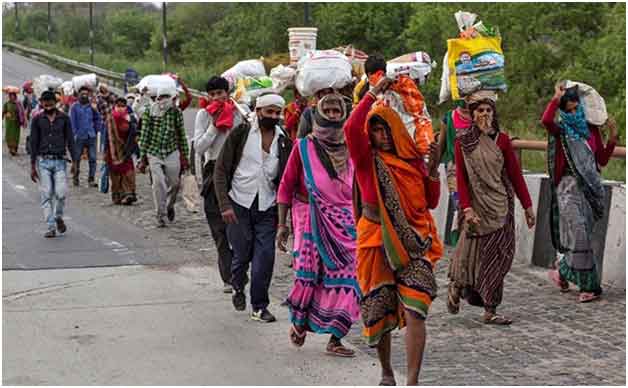
Mohammad Arif is a singer of bhajans, and usually in high demand at functions. With the lockdown, functions were cancelled and bhajan singers were no longer needed. “I’ve taken a big hit, I’m just home in Meerut now, there is nowhere to go and no money made for months,” he said, at an online press conference held by the Stranded Workers Action Network (SWAN), a loose group of social activists and workers who came together during the lockdown last year, attempting to reach aid to those stranded and helping those commuting – often on foot – vast distances to their village homes.
At the online press conference on Monday, Sima Kumari from Jharkhand said she was keen for arrangements for work to be made in the villages. Work under the Mahatma Gandhi National Rural Employment Guarantee Scheme had dried up, and those who have sought work under it are told that there are no ongoing projects. “The government must think of ways in which we can find work locally, without having to migrate. “Immediate cash transfer of at least Rs3000 should be made, so that we can tide over the crisis of not finding work. Our children have fallen behind, with no access to education – there are no laptops or smartphones in the villages, and education has just been disrupted,” she said. Sima Kumari said she had undergone training to be a health worker, but had not succeeded in her attempts to find work.
Asked whether the Union or state government should be held responsible for them, the workers agreed that there was no way their voices would reach the Union – in fact, there is need for the village level local government to be sensitive to their needs and respond to their calls for rations and the bare essentials, they said. Many workers said they had got by in the lockdown only with support from informal networks and non-governmental organizations.
SWAN had earlier released a report, No Country for Workers, which showed that workers in the informal sector in India – over 92% of the total workers in the country – had no social safety nets at all; the crisis in the lockdown in 2021 followed the pattern of desperation in 2020. Most families had exhausted all their savings, and were beginning to cut back even on dietary requirements to tide over the reduced earnings. The Union government, meanwhile, had also abdicated all responsibility, leaving it to cash-strapped states to make provision for workers.
No Country for Workers was written after interactions with over 8,000 workers, 60% of whom were daily wagers with a median wage of Rs308. At the time when they spoke to the report writers in April-May 2021, 57% of them had less than two days’ worth of rations left. Seventy six percent of them had less than Rs200 left with them when they spoke to the team; 34% had not been paid pending wages yet, and 92% of them had not received any money from employers since work stopped.
The report also cites the Oxfam report of 2020, which showed that the top 10% of India’s population held 77% of the total wealth. Corporate tax had dropped drastically as a proportion of GDP from 3% in 2010-11 to 0.9% in 2020, indicating an even further concentration of wealth. “For a country grappling with such toxic levels of inequality, not only is increased social spending morally and constitutionally imperative, it is also based on sound economic rationale. However, instead of focussing on human development and increasing human capacities, the central government under the Bharatiya Janata Party (BJP) has routinely resorted to cuts in social spending. This, naturally, has severe adverse impacts on the poor,” the report said.
Even though the Supreme Court has now ordered that the government re-determine the number of people covered by the National Food Security Act, given that population has increased since the law was first enacted, it will be a while before these orders are implemented and more workers are offered monthly rations under it. State-wise quotas under the act are in accordance with census figures from 2011.
At the press conference on Monday, Mohammad Gulzar said he was just home – there was no work under MGNREGA too in the rain, as all projects had come to a halt. He would earlier work as a labourer in the market, but there was no activity at all in the market. Speaking from Assam, Tahir mentioned that there were severe vaccine shortages too – and if he wanted to return to Bangalore, where he worked previously, he would need to produce a vaccination certificate to the labour contractor. Vaccination is not mandatory under law, but employers are now treating it as a necessity to get back to the work schedule that existed prior to March 2020.
The press conference concluded with the bhajan to Lord Ganesha, believed to remove all obstacles. It was sung by Mohammad Arif.
Rosamma Thomas is a freelance journalist
Related posts:
Related posts:
Views: 0
 RSS Feed
RSS Feed

















 July 21st, 2021
July 21st, 2021  Awake Goy
Awake Goy  Posted in
Posted in  Tags:
Tags: 
















